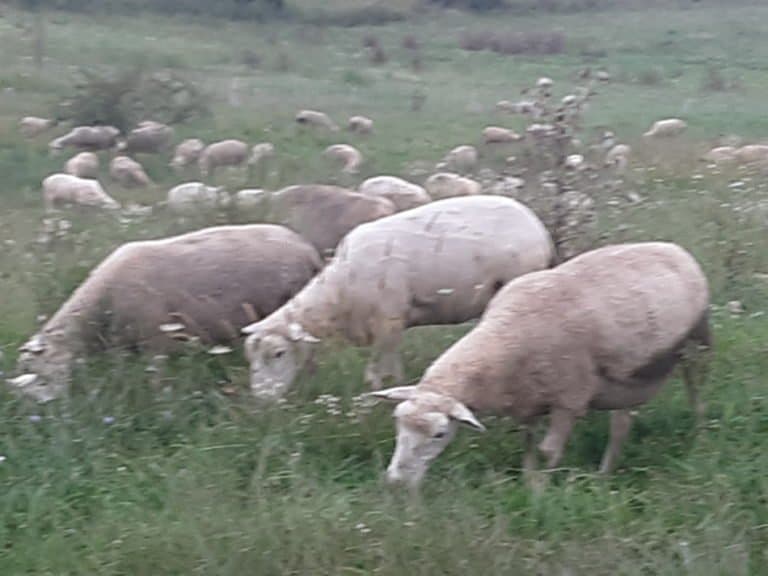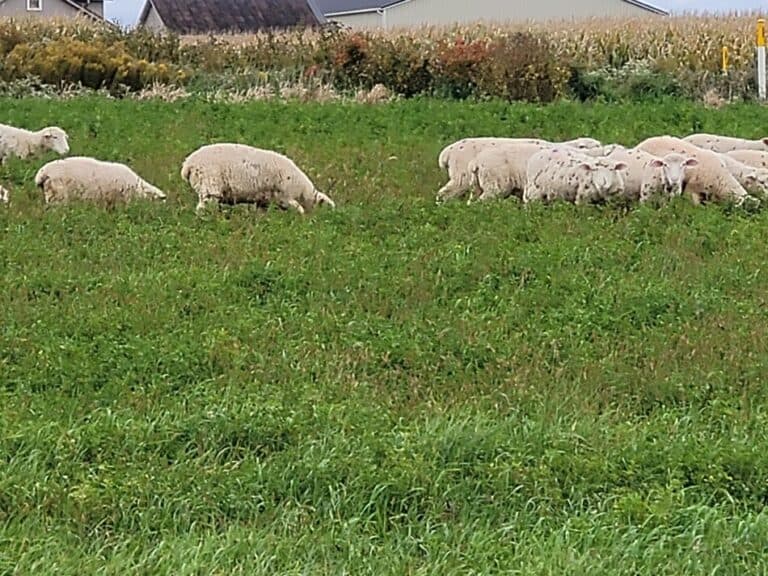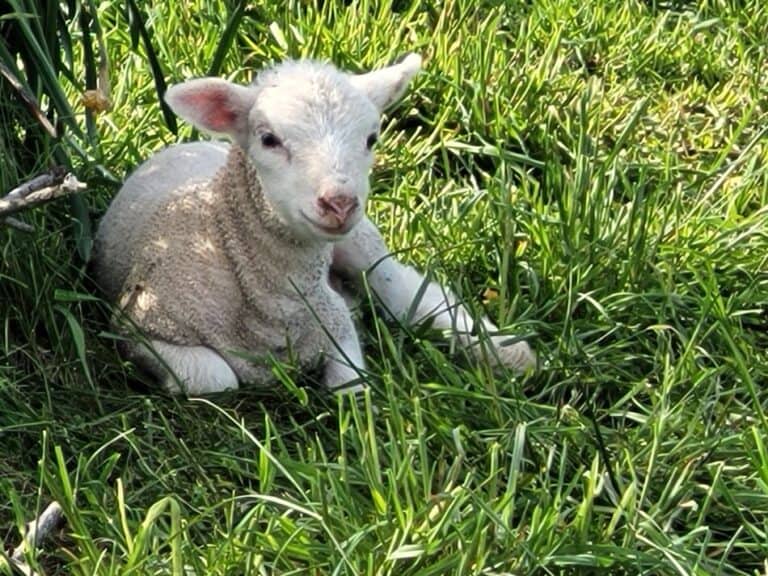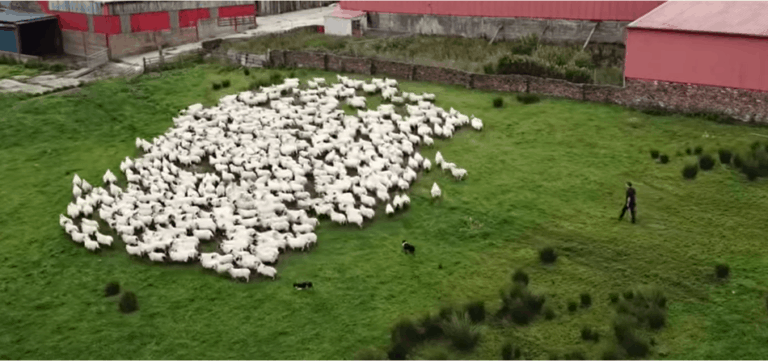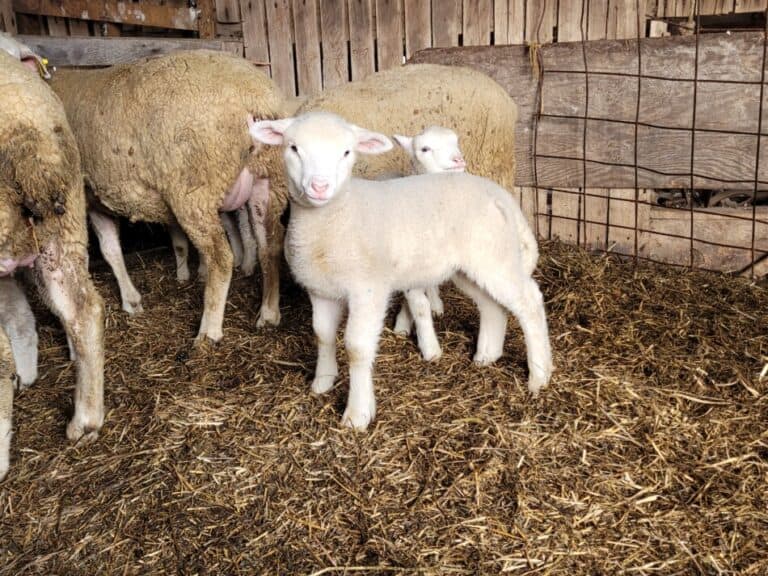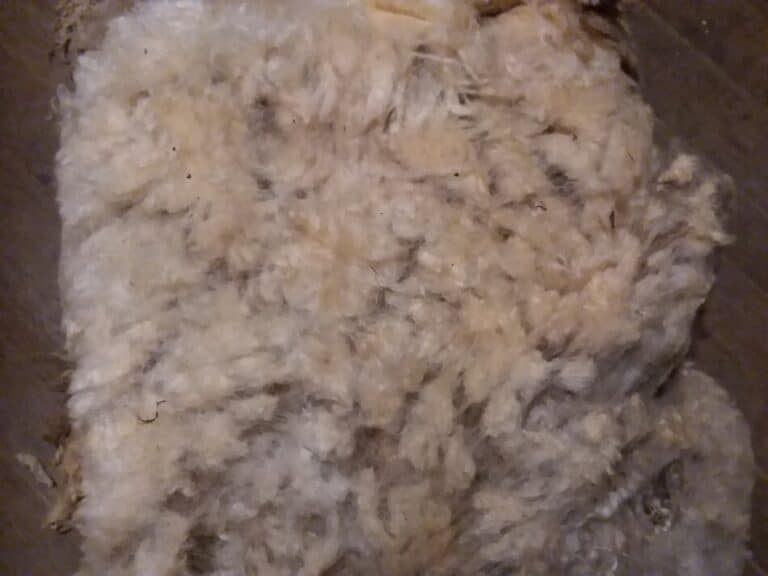Why Do Farmers Deworm Sheep?
If you have watched any sheep farming videos or talked to someone in your area who has a sheep farm, the subject of deworming the flock is likely to come up.
Why do sheep farmers need to deworm sheep and what happens if they don’t do it?
Farmers deworm sheep to reduce the internal parasites that are stealing blood from the sheep. Certain management practices decrease the flock’s contact with parasites, but once the sheep has the parasites and they are adversely affecting her health, the sheep needs dewormed to recover.
In Pros And Cons Of Raising Sheep, I list out more of the things sheep need to be kept healthy and the things they tend to have problems with, in addition to parasites.
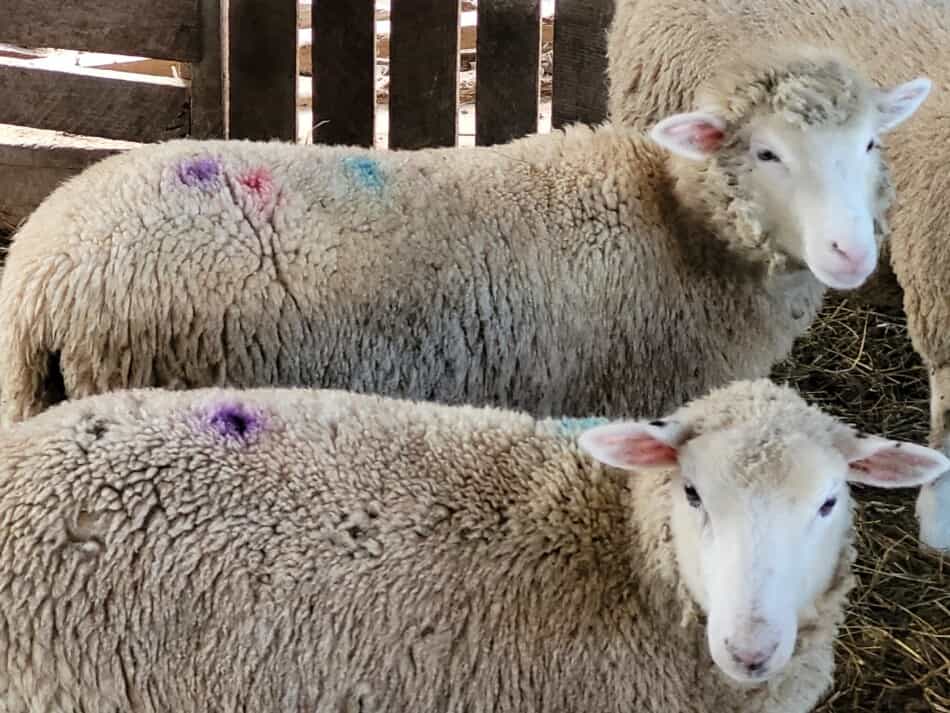
Farmers deworm sheep to reduce parasite burden for sheep
Farmers deworm sheep to reduce the amount of internal parasites that are in the sheep stealing nutrients from the sheep’s digestive tract.
In a sheep with internal parasites, everything that the sheep eats also goes to feed the parasites. The parasites live exclusively by stealing from the host animal.
It’s actually a bit worse than this, because the parasites are not stealing grass or chewed up hay, they are stealing blood.
This means the sheep had to eat the food, do the digestive work then not get the benefits from that work. This is the real problem with parasites.
The more parasites there are, the larger portion of the sheep’s daily nutrients are stolen which will eventually take more from the sheep than it can spare and cause it to die.
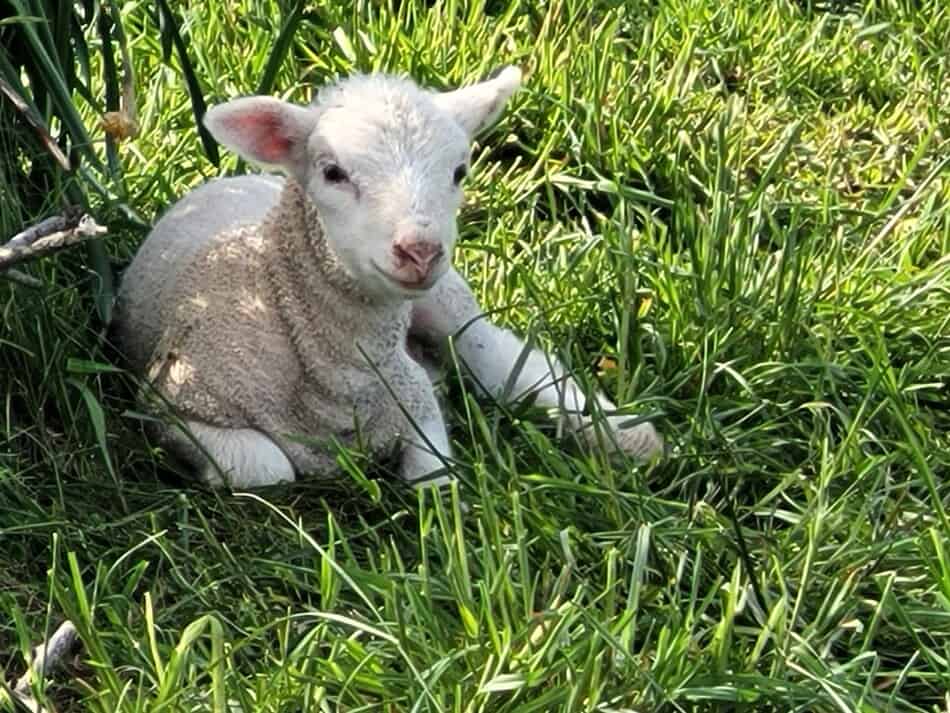
Lambs tend to have more problems with parasites
Where parasites really hit a flock hard is in the lambs. Lambs are growing so rapidly that any loss in energy from parasites stealing from them, starts to set them back.
Lambs get a double whammy here, they seem to be able to pick up parasites more easily than adults and lambs seem to have a harder time dealing with the parasites once established. Not good.
What does a lamb with parasites look like?
You’ll see negatively affected lambs that are not keeping up with their peers, appear to be a bit scruffy, do not put on weight or have poopy butts.
Each parasite steals from the lambs, but you may see some of the results of the stealing show up as different symptoms, for instance some worms cause poopy butts, others do not.
Any of these problems could have other causes, but with sheep one of the easiest things to fix first is getting rid of parasites then handling other problems if the deworming did not fix the problem.
In our experience, the vast majority of the time, deworming is a sensible action to take if lambs are not growing like they should.
The parasites are in the digestive tract
The parasites are in the sheep’s digestive tract, usually in the abomasum (part of the sheep’s stomach that is like ours) where they are attached to the wall by their mouth.
Eventually, the parasites get so numerous they take more from the sheep than it has for itself, and this is when it starts to loose weight and eventually die as the parasites eat all of the sheep’s energy.
A quick overview of the parasite cycle
Interestingly enough, parasites are in the digestive tract of an animal, sheep included, for only a portion of the parasite’s life cycle.
The adult parasites that breed and produce the eggs and soon to be adults are in the sheep, the non adults are outside of the sheep.
Here’s the basic idea: the adults breed inside the sheep, produce eggs that are pooped out, the eggs hatch and the larvae will climb up the grass to be eaten by the sheep.
Internal parasites must leave the sheep then be picked back up again to increase numbers of attached and breeding adults in the animal.
This means that sheep can have parasites and still be fine, as long as they do not continue to increase in amount of parasites by ingesting more of them.
Finding the parasites is challenging
Since the parasites are inside the sheep, they are, obviously, challenging to find!
There are ways to test for internal parasites, the most common being looking at the eggs found in the manure when it is prepared as a liquid mash and viewed under a microscope.
The microscope, slides and solution to see if there are eggs in the manure are available online and there are videos showing how to make and view the slides to determine parasite loads.
Farmers see the results of the parasites, not the parasites themselves
Usually, what the farmer sees is the results of parasites, which can be poopy butts, lost weight, general unthriftiness and bottle jaw.
By the time you see these results your sheep are already being negatively affected by the parasites.
Most farmers would have a deworming plan to knock back the parasites before they get to the level that is stressing the sheep.
Parasites steal energy from sheep
The big problem here is that parasites are stealing energy from the sheep, while the sheep still has to work to make that energy (blood) but the sheep does not get the full benefit of her work.
This is like you working a 40 hour week but only getting paid for 20 hours. The other half of your pay is automatically taken by the guy beside you who sits around all day and does nothing.
Sheep can not stop the parasites themselves
The real problem here is that sheep can not stop the parasites themselves, they need the farmer to help them out by managing the flock to have as few parasite problems as possible.
When the management does not control the parasites then the farmer needs to deworm the flock before parasites start to cause problems for the sheep.
While there are ways to reduce the likelihood of parasite problems in sheep, once the parasites are stressing the sheep, using a dewormer is the only way I know of to get rid of that parasite overload.
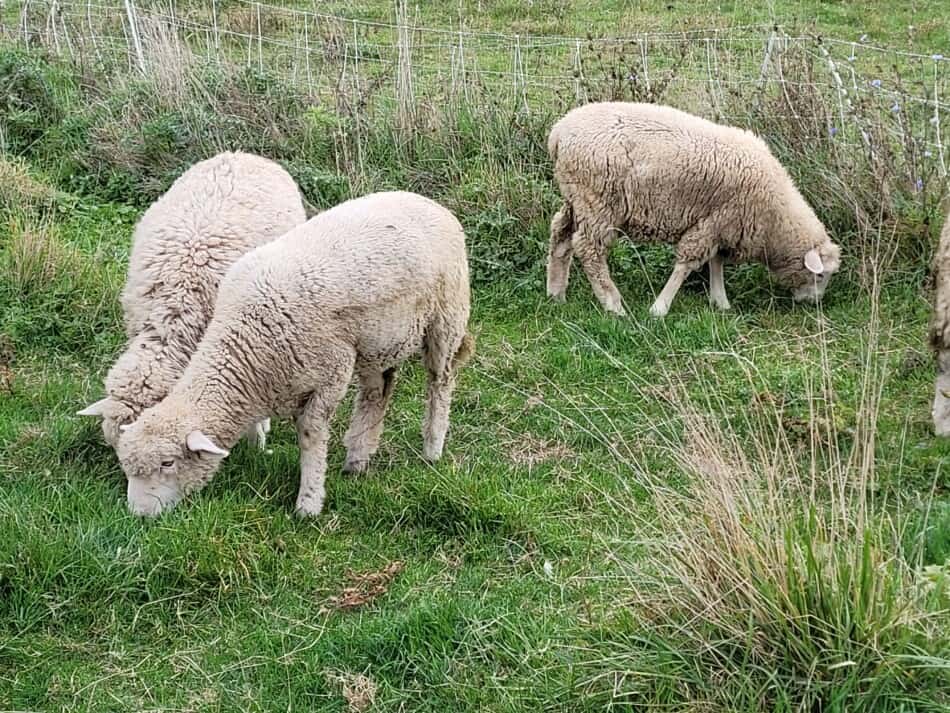
Do all sheep need dewormed?
All sheep need to be managed in a way that minimizes parasite loads, but that is not necessarily by medication in the form of dewormers.
Some farmers manage their flock’s parasite problems with changing grazing areas frequently and preventing the sheep from having access to plants that are close to the ground.
If the sheep only eat taller forages, they are less likely to ingest parasites to begin with.
What happens if you don’t deworm sheep?
If you do not deworm sheep that are having a parasite take over, that sheep will end up dead. The parasites will slowly bleed her to death, like a long term vampire.
For these sheep, deworming is the only thing that can help them kick out the parasites and recover their health.
If you have a sheep that does not have an overburden of parasites, meaning she is functioning well in your flock even if she has a small number of parasites in her gut, then you can just let this sheep carry on.
She does not need to be dewormed, as long as she is doing well otherwise.
Some sheep can function well with a small amount of parasites, while other sheep are much more parasite sensitive and need dewormers to keep down parasite numbers, it just depends upon the sheep.
If your sheep are parasite sensitive they will need more frequent deworming to keep healthy, when compared to sheep that are less parasite sensitive or susceptible.
Other sheep I have written that you might be interested in:
Why Do Farmers Put Paint On Sheep?
Can Rams Stay With Ewes All Year?
Pros And Cons Of Raising Sheep
For a deeper dive into internal parasites of sheep, read Sheep 201: Internal Parasite (worm control). This is a great site overall, click around and see what other sheep articles may be of interest to you.
